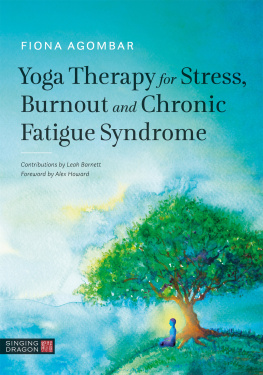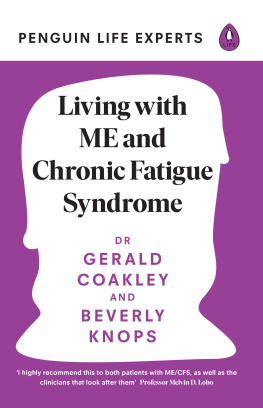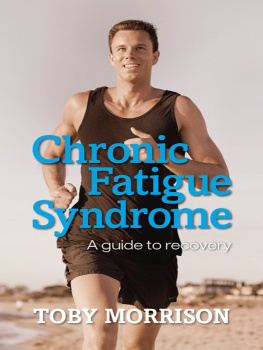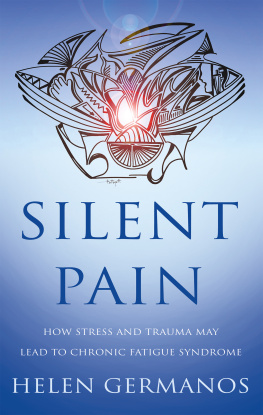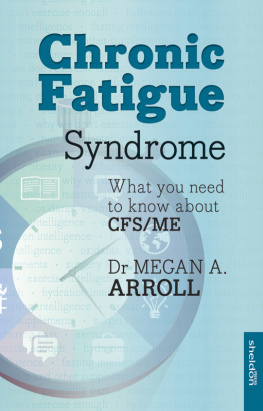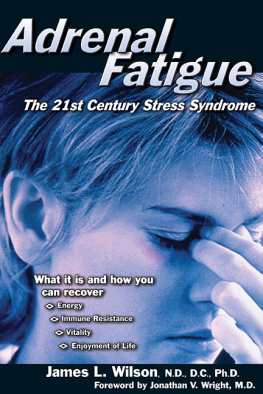Contents

YOGA THERAPY FOR
STRESS, BURNOUT
AND CHRONIC
FATIGUE SYNDROME
FIONA AGOMBAR
Contributions by Leah Barnett
Foreword by Alex Howard

Contents
Foreword
I first met Fiona in February 2004. I had recently recovered from ME/CFS through what had been an enormously challenging seven-year journey, and I was recording an audio series on different paths people could take to support their healing.
For me, yoga had been a crucial ingredient in my recovery, and Fionas first book Beat Fatigue with Yoga was an inspiration. Fiona was gracious enough to travel several hours into London to record an interview, and it was the beginning of a friendship that still blossoms all these years later.
Ive found in life that there are two primary ways people can acquire knowledge. The first is through theory, academia and empirical data. The second is through lived practice, and the playground of ones lived experience what Fiona calls a journeyman yogi. Fiona has a deeper and more comprehensive theoretical understanding than her humility might allow her to admit, but it is her commitment to living the path that I find most impressive.
When it comes to yoga therapy, this real world lived knowledge is what matters the most. It is particularly important when we are working with complex and nuanced conditions such as ME and CFS, where the empirical data is many years behind what those of us working day in, day out in the trenches know to be true.
For me, at its heart, yoga is about the relationship one has with themself and their body. To heal from fatigue in its many forms, this relationship is also critical. Indeed, our body is always communicating to us, and we learn to decipher and decode these messages what Fiona calls listening to the whispers is critical to rebuilding this relationship and supporting healing.
When this relationship is not at the heart of our yoga practice, or indeed our healing journey, we start doing things to our body, rather than in partnership with our body. When I first discovered yoga, this looked like trying to go faster and harder, and resulted in several relapses in the early period. However, in time, yoga taught me to not just connect to my body, but also to truly listen to it, to befriend it, dare I say even learn to love it, despite its imperfections and challenges. I wish the same for you and for your students.
It is Fionas qualities of deep knowledge and wisdom, coupled with lived experience, heart and humility that make this book such a precious resource. In the coming pages you will learn a lot about the relationship between stress and the body, the important models that yoga offers to make sense of illness and how you can utilise the power of the yogic path to increase energy, calm the nervous system and heal the body. But what you will learn is more than just theory, it is tried-and-tested living wisdom.
It is a fascinating journey, and Fiona and Leah cover a lot in one book, so I encourage you to approach it with the same diligence and care you would your yoga practice. Go slowly, take your time and open your heart to the possibilities within all of us to heal and transform.
Alex Howard
Founder of The Optimum Health Clinic
Introduction
We live in challenging times, as the advent of the worldwide Covid-19 pandemic has demonstrated. Probably more than ever before, we need tools that can help us to manage the dramatic changes that are happening and the stress that this has created for all of us. This book has been through several evolutions, which makes it very relevant for what is happening today, as it has grown together with the recent global changes.
When I originally studied Vedanta in India in 2010, I was so moved by the teachings that I decided to share some of the ideas with my yoga students. Many of the people that I worked with had Myalgic Encephalomyelitis (ME), also known as Chronic Fatigue Syndrome (CFS), and were looking for ways to lessen their distress. Others were suffering from the long-term effects of stress or even burnout. Since 2007, I had run courses for yoga teachers on how to teach yoga to people with stress and extreme fatigue states. I discovered that many teachers were confused about how to deal with students affected by these conditions. We live in a society that encourages us to do all the time. This has trickled down to the yoga world so that some teach in a way that makes yet more demands on doing and competing rather than just relaxing and being. In other words, there are forms of yoga that can make people even more stressed and tired, rather than bringing relief to the situation. So I started to write this book for my students, for all the people who had, like myself, suffered with exhaustion to the point of illness and for those who were literally burning out. This book is also for yoga teachers and yoga therapists everyone interested in the subjects of yoga, stress, burnout, exhaustion and ME/CFS.

